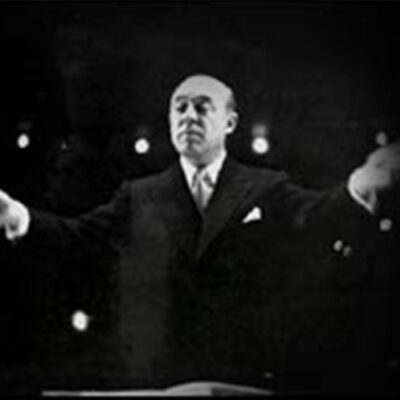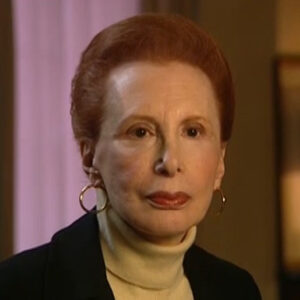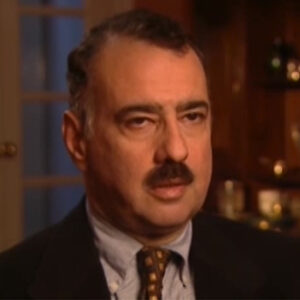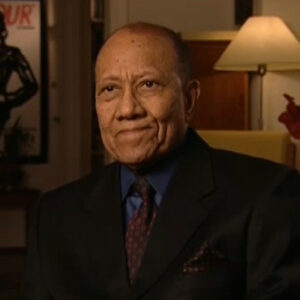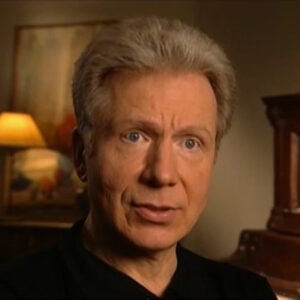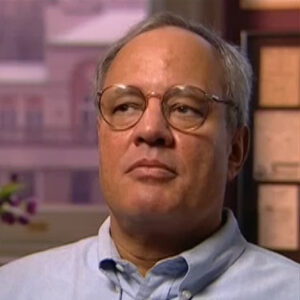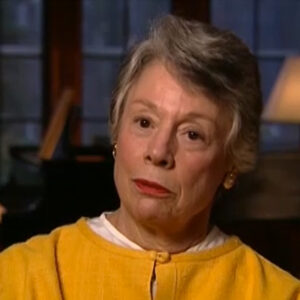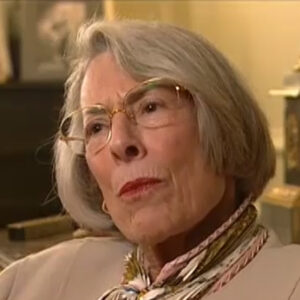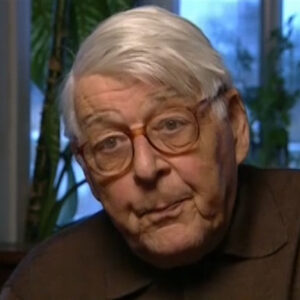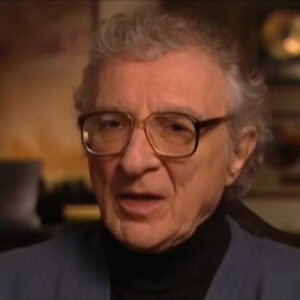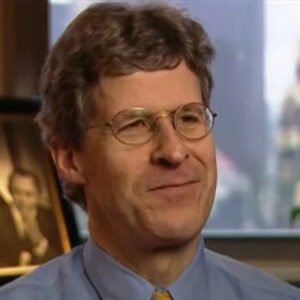Speaker 1 Well, in the
Speaker 2 time before talking pictures, which is around
Speaker 1 1931, the great popular public
Speaker 2 musical entertainment was musical comedy, which is an outgrowth
Speaker 1 in
Speaker 2 American terms of
Speaker 1 a
Speaker 2 curious amalgam
Speaker 1 of operetta,
Speaker 2 was one strand of it and burlesque is another. The burlesque, which is misconstrued as a sex show now, was originally a kind of musical storytelling, a low comic, one with a sort of kind of travesty of a story that allowed young, talented and not so talented people to sing and dance and carry on for two hours. But it was extremely
Speaker 1 popular and
Speaker 2 especially popular since song in the 20th century became a sort of defining way in which the culture understood itself. Things started to
Speaker 1 change in America
Speaker 2 with the turn of the century. There was a new speed, a new industrialism, a new a new influx, a huge influx of immigrant population. And the musical caught this
Speaker 1 and reflected it back to the public. I remember reading a lyric of George
Speaker 2 M. Cohan’s which goes something like Kissme and
Speaker 1 Run Kid.
Speaker 2 It’s nineteen oh one kid.
Speaker 1 Oh God, I can’t. A Yankee with no how
Speaker 2 can’t afford to go slow. Now the whole idea of the momentum of the society changing and the song because song then was so much in tune with the public
Speaker 1 capturing and measuring
Speaker 2 the shifts moment to moment of
Speaker 1 the public.
Speaker 2 So the musical comedy became a kind of marriage of song and comic
Speaker 1 turn and light entertainment. People went there
Speaker 2 like they might turn on a television now for a good night out without too much thought,
Speaker 1 but with a
Speaker 2 lot of fun and contemporary references.
Speaker 3 Um, set the stage for us in the late teens and writers in the party to see what was happening on Broadway. How many theatres? Well, how much how many shows compared with today.
Speaker 1 Yeah, I can do it. I’ll let me let
Speaker 2 me say that Broadway was a very flourishing business. It was dominated before Rodgers and Hart came on the scene largely
Speaker 1 by the the
Speaker 2 high tone operettas of Sigmund
Speaker 1 Romberg and Jerome Kern.
Speaker 2 The regular sort of. Sort of. Jolly satirical musicals or satire is too strong a term comic musicals and sort of the very, very delightful, jingoistic sort of proletarian musicals of, say, George M. Cohan, which were really energetic and understood the
Speaker 1 public and really very, very pro-American
Speaker 2 flag-Waving, jingoistic entertainments. And the thing about Rodgers and Hart were that they were college boys and this was a new breed. This was the first really of most of the energy from American popular culture, came
Speaker 1 from the the brilliant but on
Speaker 2 uneducated talent of the immigrant
Speaker 1 population. My father, Bert La, Groucho Marx, Ethel Merman,
Speaker 2 all these people who came to define the musical comedy culture of the first half of the century
Speaker 1 were not literate in that in the way we now think of it. But the people who wrote
Speaker 2 the musicals that form the body
Speaker 1 of the great of
Speaker 2 the great catalogue of American musicals were educated and they reflected an American middle class and the values of a middle
Speaker 1 class.
Speaker 2 And it’s interesting that Rodgers and Hart came together in 1918, which is exactly the same year, and I think almost within a month or two of
Speaker 1 when
Speaker 2 George Gershwin and his brother sat down. To write their first song, which was Irag. Which was, again, interesting, syncopated
Speaker 1 borrowing of black rhythm,
Speaker 2 whose broken melody as a broken line allowed
Speaker 1 for a lot more, a lot more internal
Speaker 2 rhyming, a lot more interesting rhyming.
Speaker 1 And what what what Rodgers and Hart and Gershwin, the Gershwin boys
Speaker 2 saw was that there was a new time. It was a new time. America was changing and the musical had to speed up not only in its tempo, but in the smartness of its lyrics.
Speaker 1 And they were they were they had different
Speaker 2 language for this and different ways of expressing it. But they were all on the same course. It was a sort of
Speaker 1 the America coming of
Speaker 2 age defining itself not from a European perspective
Speaker 1 operetta, but
Speaker 2 from its own indigenous industrial. Cultural imperialism, a sense of what it was, what was happening in the culture
Speaker 1 and how that
Speaker 2 culture expressed itself, you know,
Speaker 1 I remember
Speaker 2 reading that when Rogers met Hart for the first time, Hart expounded on
Speaker 1 how how.
Speaker 2 Bad, the the rhyming was in popular musicals and it was crude. There was no internal rhyming. The references were very un literate. I mean, because people like George Cohan, who was one of the great popular songwriters and innovators of the early American musical, who was insisted on
Speaker 1 singing about
Speaker 2 Yankees, about
Speaker 1 America, you know, you know,
Speaker 2 don’t give me no Waggner strain.
Speaker 1 I want what does he say? I want I want to give me that
Speaker 2 Yankee strain with. So I’m going to get a little let me get this right. It’s worth getting what? It’s going to be hard for me to do it without me being
Speaker 3 close enough to really see. OK, start it started sort of introduce it again. Well, let me ask you. Yeah, um, maybe you could come at it this way, is it first generation Americans becoming American as opposed to immigrants?
Speaker 2 Americanising Cohen was the first to take that to try to seize the musical and shake off its Europe vestige of European sort of Whyatt qualities. He he saw it as it properly is, as business art
Speaker 1 for
Speaker 2 the proletariat. And his songs even sort of stated the sort of aesthetic. And in one call, one song which I love, called I Want to Hear a Yankee Doodle tune. He sings, Give me a tune that’s worth listening. Give me a tune that words that’s worth a whistling. I want to suza strain
Speaker 1 instead of a Waggner pain.
Speaker 2 Give me the trombones, give the trombones a chance to blow on it, give me a dash of rag and go in it you know. So he’s talking about the you know, let’s assert the Americanness of the musical, the noise of the city,
Speaker 1 the the energy and vulgarity of our
Speaker 2 own indigenous natures with something with music to please the gang, he said, with plenty
Speaker 1 of biff and bang.
Speaker 2 Now that’s really interesting as a statement, but also it’s very crudely rhymed.
Speaker 3 Start again. That’s interesting. That’s OK.
Speaker 2 That’s very interesting as a statement. But it’s very crudely rhyme that it’s exactly the kind of thing, although it’s a really energetic and showstopping song, you can see how it would stop a
Speaker 1 show and get
Speaker 2 the audience cheering. An American audience cheering. But at the other on the other hand, as a as a piece of songwriting, it’s crude, energetic, but crude, like the culture it was in the early part of the twentieth century. Now along comes an educated songwriting team like Rodgers and Hart. And of course, what they wanted was to create a much more sophisticated,
Speaker 1 ironic, mordant,
Speaker 2 witty songs that reflected their age, their generation, which was the next generation post-World War
Speaker 1 One, college educated generation, middle class, literate, already at home in America and
Speaker 2 wanting the music. And the lyrics to reflect.
Speaker 1 Their world,
Speaker 2 which was a world of promise, of ease, of abundance, of confidence and a certain amount
Speaker 1 of. Bourgeois ennui. They were they had everything. And yet they weren’t happy.
Speaker 2 And that is the that is the particular provenance of Lawrence Hart, who was a ship without a sail, as he wrote, who felt a kind of loneliness in the midst of plenty and. Who used the songs to define both that unusual state of affairs in the in the American conscience, which the culture didn’t always understand, especially at that time, and this sort of booster 20s and the sort of flush of the post-war sort of frenzied delirium to find happiness after a kind of bad for years, plus just a general sense of literate
Speaker 1 fun they want to.
Speaker 2 And lyrics and Rogers music really just were sprightly and
Speaker 1 young and confident that they were
Speaker 2 able to take the musical in a sort of
Speaker 1 more youthful, playful direction.
Speaker 2 The lyrics were
Speaker 1 really witty
Speaker 2 and different. There was a lot more interior
Speaker 1 rhyme, a lot more
Speaker 2 contemporary references and sort of knowing references to
Speaker 1 what life
Speaker 2 is really like. And I mean, the perfect example would be bewitched, bothered and bewildered, a song which was originally set to the lines Bitched, Buggered, and the dildo, as you know.
Speaker 1 But the. Vexed again, perplexed again. Thank God I
Speaker 2 can be oversexed again. Well, that’s just a huge
Speaker 1 wink at
Speaker 2 an audience that is just wonderfully
Speaker 1 playful and clever and sharp,
Speaker 2 which is what? The game of. Those lyricists, the great ones, Heart and Harbor II Harbor,
Speaker 1 being in my for my
Speaker 2 mind, the two most showy of the of the lyric wits
Speaker 1 of that period.
Speaker 2 Now, sorry, it’s so so where the where the Amusa the musical really got oxygen. Was when it’s an interesting convergence in
Speaker 1 which it really happens around 1925 and
Speaker 2 there are a lot of reasons for that. First of all, the subways come to Broadway, Neon comes to Broadway in 1924, the idea of your name being above the lights, The New Yorker starts
Speaker 1 publishing in 1925, making a myth of
Speaker 2 Manhattan as a playground. And a lot of the people who were writing for The New Yorker magazine were writing for Broadway. And it’s interesting that. The first Rodgers and Hart musical that was professional, they’ve done a lot of things in college, was a sort of revue called the Garagos in
Speaker 1 1925 in
Speaker 2 which they took a song out of
Speaker 1 their trunk called Manhattan.
Speaker 2 A great song which refers to Manhattan as an isle of joy. Well, that fantasy Manhattan as an isle of Joy is really a fantasy.
Speaker 1 Generated by broadcast
Speaker 2 Broadway and broadcast by lyrics.
Speaker 1 And. That. Comes together by
Speaker 2 nineteen twenty seven, there was a sort of sudden rush of building new theaters, it was a real demand
Speaker 1 for theater
Speaker 2 and it’s hard to imagine because now on Broadway as we speak
Speaker 1 and in the year
Speaker 2 2001, there are there are almost no serious plays on Broadway and there are probably all total maybe 35 productions a year on Broadway
Speaker 1 at the
Speaker 2 time of their entry into Broadway as serious composers. That’s to say around 1925,
Speaker 1 there were by
Speaker 2 1927 on Broadway, there were two hundred and sixty eight shows a year, two hundred and sixty eight. So there was a great
Speaker 1 demand
Speaker 2 for entertainment. There was, there was it was comparatively easy to comparatively easy to have to to find both an audience and to get to have a few. Very good to, to get something up. So there was a lot of action and a lot of activity and it was a great seedbed for
Speaker 1 talent and where they could they could really work, like
Speaker 2 perhaps nowadays the the rock world is
Speaker 3 are we OK outside? And we’re going to lose our barn doors. Well, there are times when there was plenty of great time and yet. Heart was lonely. Can you tell us why, what your take on that is and how sure Roger’s paired teams worked with didn’t?
Speaker 1 Well, I mean, the issue between them over
Speaker 2 the years or, you know, all these songs. Of every composer are naturally because their songs, they are from the heart and they express the heart and no pun intended.
Speaker 1 And the thing about.
Speaker 2 Lauren’s heart was that he was a very small man, diminutive,
Speaker 1 and he
Speaker 2 had his his songs are very interesting. Each one of the great composers
Speaker 1 on the Broadway canon,
Speaker 2 the great lyricist, the Broadway came,
Speaker 1 each
Speaker 2 one of the great lyricists in the Broadway canon comes at sexuality, which is, after all, the centerpiece of all lyric writing, a romance, 85 percent of the songs, classic songs are about love and so forth with a different take. And for instance,
Speaker 1 Harburg
Speaker 2 is about is about sex is about having sex. Last night when we were young, Sondheim is about just being able to
Speaker 1 feel, you know, anything.
Speaker 2 Gershwin is sort of almost collegial.
Speaker 1 It’s not about
Speaker 2 really sexuality
Speaker 1 or at heart is about
Speaker 2 having someone hold his hand. It’s about companionship. It’s about wanting to be with someone
Speaker 1 on
Speaker 2 the ship without a sail is a perfect example. Still alone. Still at sea. Still no one to care. For me, something along those lines is that. Can I stop and just see if that’s right?
Speaker 1 Can I get if you can can I
Speaker 2 bring up here and just so you can get me a close up so I can read it so I’m not
Speaker 3 in trouble. Is looking
Speaker 1 ok. How about ok.
Speaker 2 OK, ok. I can do it this way with on my foot.
Speaker 1 All right.
Speaker 2 I mean for instance in a ship without a sail he says still alone. Still at sea. Still there is no one to care for me when there’s no hand to hold my hand. Life is a loveless tale. For a ship without a sail. So that’s it again, hand holding his hand, wanting to be with someone and eventually hearts sort of romantic involvements where hapless
Speaker 1 and he he
Speaker 2 he was, interestingly enough, caught in that bisexual situation, which
Speaker 1 he he couldn’t handle and which ended up in him
Speaker 2 increasingly becoming alcoholic, which was the
Speaker 1 trajectory, the tragic
Speaker 2 trajectory of his life through the 30s and finally
Speaker 1 ended up with him
Speaker 2 unwilling to collaborate with Rogers when he broached the idea of doing greengrocer’s lilacs, which became
Speaker 1 Oklahoma, and when Hart wouldn’t and couldn’t write that
Speaker 2 actually it was not in a spirit which heart could actually have embraced. I don’t think
Speaker 1 then
Speaker 2 Rodgers went with Oscar Hammerstein and the rest is history.
Speaker 3 Great, um, I was going to jump ahead, but I think I’m going to wait on that, um. What was their competition when they broke on the scene?
Speaker 2 Well, it’s hard. You know, there was one of the reasons they were good was that there was a lot of good competition. I mean, there was a lot happening. And they were just an enormous I mean, they were the Gershwins. There were there was Harburg and Arlen.
Speaker 3 OK, one of the reasons
Speaker 2 one of the reasons they were so good was the musical climate of the late 20s and 30s was just
Speaker 1 hugely, hugely competitive and very
Speaker 2 good. And those guys being we’re always trying to top each other and outdo each other. There was Irving Berlin in a class by himself. There was Harburg and Arlen. There was the Gershwins and himself. And that’s Vernon Duke. They were
Speaker 1 just a huge number of of good
Speaker 2 composing teams out there writing very witty stuff. So it’s a matter of it’s a matter of horses for courses. You know,
Speaker 1 I actually my own feeling is that
Speaker 2 Hearties wrote the wittiest some of the wittiest lines
Speaker 1 of
Speaker 2 his contemporaries. I mean, when love congeals, it soon reveals the faint aroma of performing Seale’s. But he also wrote some of the worst lover.
Speaker 1 When I’m
Speaker 2 near you and I hear you speak my name softly in my ear, you breathe a
Speaker 1 flame, you know, blow torch. I don’t know.
Speaker 2 I mean, it’s a it’s terrible
Speaker 1 and very fast.
Speaker 2 And he’s he’s so facile at rhyming that sometimes, as in Zipp, which is a completely brilliant song,
Speaker 1 theatrically and lyrically,
Speaker 2 the rhymes are he’ll just throw in anything to
Speaker 1 get a rhyme.
Speaker 2 And it’s it’s too easy almost for him.
Speaker 3 Tell us about Roger’s writing the music first and what is he giving? What’s the seed that he’s giving to heart?
Speaker 2 Well, now, that’s very hard for me to do. But, you know, the point is, you can’t I’m talking about heart more. One of the things is you cannot separate the song from the sound.
Speaker 1 And I think I think I think
Speaker 2 what he gives to heart is this
Speaker 1 wonderful lyric gift that
Speaker 2 he has sort of this wonderful
Speaker 1 melodic gift,
Speaker 2 which is sort of underpins.
Speaker 3 Perhaps you can start that again.
Speaker 2 Oh, yes. What Rodgers gives to heart,
Speaker 1 it’s like it’s like a current
Speaker 2 it’s a kind of steady melodic inventiveness.
Speaker 1 That count is kind of a counterpoint
Speaker 2 to the kind of quixotic
Speaker 1 wit
Speaker 2 of heart, the sort of
Speaker 1 mercurial
Speaker 2 quality of his wit. It’s a it’s something insistent and sincere
Speaker 1 that
Speaker 2 plays against. Hart’s own inveterate cynicism. I don’t feel that there’s any cynicism at all in in Hammerstein’s music. I think it’s heartfelt and earnest
Speaker 1 and beautiful and and that
Speaker 2 comes out when he collaborates more with someone who’s actually in sync with his sensibility, like Hammerstein.
Speaker 1 Whereas I think that they that Hart and Rodgers were
Speaker 2 interesting contrasts, because
Speaker 1 I think that I look at I look
Speaker 2 upon Rodgers as a as a as a rather earnest, sincere, serious, obsessive individual
Speaker 1 and
Speaker 2 Hart as a cynical, lost soul,
Speaker 1 mordant, quixotic, not very had great trouble getting heart.
Speaker 2 Rodgers always had great trouble getting heart in the room to work. I think Hart’s life was too. He was too. As he writes, he was too uneasy in his easy chair.
Speaker 1 And that comes
Speaker 2 through that sort of feistiness, that
Speaker 1 edginess and.
Speaker 2 I think that there’s something centered in Rogers music, something some sort of. Plaintive. But optimistic because, of course, again,
Speaker 1 very American, very bourgeois, very full. Why should he not be optimistic? He lived a life of total privilege,
Speaker 2 which is the gift and the problem
Speaker 1 of the
Speaker 2 American musical.
Speaker 3 I wonder if we transposed people around. You started by saying I’m Hammerstein’s music. I did, yeah, I think you want to hear it or do you want to?
Speaker 1 Well, I mean, I meant I meant that
Speaker 2 Roger’s music and the implications in it, the sincerity, the lyrical qualities were
Speaker 1 much more
Speaker 2 in sync with Hammerstein’s own lyrical intentions, having wasn’t as Mordente was a heterosexual, was sincere, was patriotic, was not as ironic
Speaker 1 and bitter and unhappy
Speaker 2 in himself. And so that means that the that the words sit on the lyrics in a different way entirely. And it’s also, you know, it’s something about age here. When they started writing, when Rodgers and Hart began writing, they were youngsters and youngsters with all the sort of impudence. The music is imputed. The lyrics are really important.
Speaker 1 And of course,
Speaker 2 as you get older and suffer and lose
Speaker 1 in life, then
Speaker 2 a certain other kind of tone, a sadness in the case of Hart’s lyrics
Speaker 1 comes into it. And I think I think that the thing about Hart
Speaker 2 and Rodgers is that they were right for their time.
Speaker 1 And, you know, when Hart was at the opening night of Oklahoma and
Speaker 2 came up to Rodgers after.
Speaker 1 The show and with genuine
Speaker 2 enthusiasm said this is going to run for 20
Speaker 1 years, the
Speaker 2 time he died about two weeks later, but the times had changed.
Speaker 1 And I think
Speaker 2 that in some sort of unconscious way, Rodgers was
Speaker 1 had shifted, even though he hadn’t wanted to had shifted
Speaker 2 to a sensibility that was
Speaker 1 going to ride the next generation better than
Speaker 2 the generation that wanted to consolidate itself, wanted to
Speaker 1 take. They wanted to retreat from the world to find
Speaker 2 happiness after a decade of depression and then four years of a world war. It wanted to seek out individualism. It wanted to hold the dream. And it was Rodgers and Hammerstein
Speaker 1 that wrote, If you don’t have a dream, how are you going to have a dream come true? But that dream
Speaker 2 was always being teased in the 30s because indeed it was never a dream
Speaker 1 that came true for heart, emotionally
Speaker 2 or for the society which was in complete disarray.
Speaker 3 So tell me whether you’re saying that if Rodgers was better suited to Hammerstein, I think it’s, um. Was he not well suited to.
Speaker 2 Say that again,
Speaker 1 I don’t get your question.
Speaker 3 You’re saying that he mellowed, he he was very and entitled to Hammerstein’s what music for himself? Was he not well suited sort of devil’s advocate?
Speaker 1 No, but what happened
Speaker 2 was that
Speaker 1 the game changed.
Speaker 2 When Walt Rodgers and Hammerstein, Rodgers and Hart. In the 20s and in the 30s were really writing musical comedy, that is to say the show, the stars of the shows were really the songs. I mean, you know, those those song like Zipp or song like The Lady is a Tramp or You Took Advantage Of Me
Speaker 1 are just huge
Speaker 2 showstopping songs. They’re sensational, nothing. They’re just sensational.
Speaker 1 They will live forever.
Speaker 2 Now, one of the reasons they’re sensational is that the rhymes are sensational. The music, which is great and memorable, the rhymes are sensational. Now, when the musical’s job description
Speaker 1 changed
Speaker 2 to telling a story in song, first of all,
Speaker 1 the notion of comedy dropped from the
Speaker 2 definition of the musical. So it was no longer musical comedy, but a musical. Second of all,
Speaker 1 the goal of
Speaker 2 the lyricist was
Speaker 1 now
Speaker 2 to make the song serve the character and the story and not to call attention to itself as a as a star turn. And that is where rhyming changed. So Hammerstein’s goal was not to use rhyme often because it called
Speaker 1 attention away from the plot and the character. And of course, in the Rodgers and Hart
Speaker 2 shows where there really wasn’t very much plot to speak of and there wasn’t much character to speak of. The rhyming served as a kind of star turn to as its own story, as its own plot, as its own expression.
Speaker 1 And when
Speaker 2 the musical changed, as it did with
Speaker 1 Oklahoma finally and forever, then that
Speaker 2 particular strong suit of hearts.
Speaker 1 Would have had to have been
Speaker 2 subsumed in something else,
Speaker 1 you know, in a in a narrative, and he
Speaker 2 died before that was ever tested. But even in their greatest shows together of the Rodgers and Hart shows, pal, Joey, if you really listen to Pal Joey, the songs are wonderful. And it is true that the story is more there’s an attempt to tell a story and it’s certainly more Mordente and and adult. But the reality is it’s not a very good story. It’s not a very well told or well-built musical, however good John O’Hara’s original tale was, it doesn’t work as a musical story. It needs to be rewritten if it’s ever
Speaker 1 going to be really done again in a major way, however
Speaker 2 good the musical numbers are. So we, you know, in a sense, in the way that these things happen, people I think maybe as tragic as Hart’s death was. He died at. The time.
Speaker 1 That he may not have weathered
Speaker 2 the discipline of subsuming his gifts to the story, the way Rogers was able to to weather that because the music was always there to be used
Speaker 1 in any narrative way.
Speaker 2 It’s just that what changed in the American musical was the intention to make the musical grow up
Speaker 1 by making it.
Speaker 2 Serve something larger than. Giving an audience a good time.
Speaker 3 It was the big thing. And why why do people go now?
Speaker 2 Well, just as the there was this boom in theater in 2007 when the Depression hit, and it really although it officially hit in 1929, it really didn’t sink in.
Speaker 1 And the culture didn’t really
Speaker 2 feel it strongly until about 1931.
Speaker 1 But when that happened, that happened to be the year that Rodgers and Hart went to Hollywood.
Speaker 2 There was a huge exodus that coincided with.
Speaker 1 The depression, on the one hand,
Speaker 2 closing a lot of the theaters, there was not work, these two hundred and sixty six shows dropped dramatically and the number of musicals, I think, dropped from something like to something like
Speaker 1 by
Speaker 2 1934 or five, like 35 musicals a year
Speaker 1 now.
Speaker 2 Therefore, where there was steady work was in Hollywood that had just discovered this technique called sound. So that the musical
Speaker 1 became
Speaker 2 and this is an important thing that the musical had a now a cinematic. String to its bow, and the difference was that the these theater artists were now controlled by corporate executives, which is why Rogers hated it. They were they were writers for hire. They weren’t making up their own stories, but they were just jobbed in living in the lap of luxury in the sun, making a fortune. But it’s interesting because to me, because the musical.
Speaker 1 In film,
Speaker 2 merely exaggerated what because of its. Power to broadcast song deeper into the souls of the citizens of America. It merely exaggerated the political importance of of the musical as a as political theater. The it’s often said it’s
Speaker 1 often thought that political
Speaker 2 theater is only left wing.
Speaker 1 Which is wrong.
Speaker 2 The musical is America’s great political theater.
Speaker 1 It is profoundly
Speaker 2 effective as political theater because it’s not seen as such. But what it does is it convinces in the in the joy that it creates its sells a
Speaker 1 worldview, a worldview
Speaker 2 that tells you, as Rodgers and Hammerstein did,
Speaker 1 that if you don’t have a dream, how are you going to have a dream come true?
Speaker 2 It tells you as it sells in ideology, it sells a sense of abundance. It sells a belief in the goodness of the culture which the culture and the musical sustained until it till until it
Speaker 1 came around with Vietnam and couldn’t that that believe
Speaker 2 couldn’t be sustained in song anymore. But but the musical is the most important. Messenger of the status quo that American society ever
Speaker 1 had,
Speaker 2 and so that makes somebody like Rodgers and Hammerstein
Speaker 1 major
Speaker 2 unwitting perhaps agents of. Reaction because in their pleasure, they are telling a society in the 30s,
Speaker 1 cool it, they
Speaker 2 are you know, this is a society that is breaking down. This is a society
Speaker 1 with
Speaker 2 millions of people out of work with
Speaker 1 the culture, not
Speaker 2 capitalism in real disarray. It’s it’s providing its true joy and pleasure and distraction
Speaker 1 on the one hand. But the
Speaker 2 implications of that distraction
Speaker 1 are. To put it in a
Speaker 2 phrase, don’t rock the boat. And that’s where the musical always serves a political purpose and a propagandistic purpose.
Speaker 3 Again, I think we switched names, you say, in the 30s and Rodgers and Hammerstein.
Speaker 2 I did. I’m sorry. I meant in the 30s.
Speaker 3 Just give it a short sentence about that.
Speaker 2 In the 30s, Rodgers and Hart served
Speaker 1 as real political, unwitting, albeit unwitting politicos of of political
Speaker 2 influence, but a reactionary one, as all musicals did,
Speaker 1 even the ones that purported to be left wing. It’s odd that
Speaker 2 because the musical as a as an enterprise really is a is as is like a macrocosm that right now is it is capitalism in in microcosm. It’s it’s its investment, it’s big risk and big return. And the story of every musical is the story of, you know, it’s the story of the American dream. It’s going out an unknown and coming back a star. It’s it’s it’s long runs, it’s money, its privilege.
Speaker 1 It’s it’s the good life.
Speaker 2 It’s pluck and luck. It’s all those themes rolled into
Speaker 1 one little game of show and tell.
Speaker 3 And Rodgers wasn’t just a composer.
Speaker 1 It what do you mean by that? It was a producer. He was a businessman and he was. That’s right. And he wrote the book, too.
Speaker 2 And he was living
Speaker 1 that life, say?
Speaker 2 Well, yeah, Rogers wasn’t just a composer. He was a businessman. He was a producer. He was a book writer. He was living the big life, small man, living the
Speaker 1 big life and and being.
Speaker 2 And these you know what
Speaker 1 what what we
Speaker 2 realize about All Stars is and you have to consider Rodgers and Hart and Rodgers and Hammerstein huge stars of American
Speaker 1 entertainment.
Speaker 2 All stars are. Are performing workhorses that prove that the system works. You look at these guys, you say, huh,
Speaker 1 see,
Speaker 2 I just keep at it, if
Speaker 1 I keep working
Speaker 2 and I trust myself, it’s going to pay off.
Speaker 1 I’m going to have a big payday. You know what I mean?
Speaker 2 And they’re sort of their stars of free enterprise is what they are. And that’s what they’re
Speaker 1 that’s part of in
Speaker 2 a competitive society, they are the they
Speaker 1 are the the high watermark that
Speaker 2 by which everybody sets their standard, you know, so they inspire envy, which is the gasoline of American culture, as we know.
Speaker 3 It’s a great line. Let’s come back to that.
Speaker 2 Yeah, because, I mean, it’s a bit, but it will explain again why.
Speaker 1 What was radical about Oklahoma?
Speaker 3 OK. Let’s finish this, OK? Yes, for sure. So what were they missing by by
Speaker 2 the time
Speaker 1 by the time they got you
Speaker 2 know, by the time the culture was in a quandary, the society couldn’t how to celebrate
Speaker 1 when
Speaker 2 everything was collapsing.
Speaker 1 I told you the plane I thought was there.
Speaker 3 It was like they died or something. And he said, you’re right. I’m going to go back to New York.
Speaker 1 Oh, yeah, oh, yeah, well,
Speaker 2 that happens a lot of their rusticated out
Speaker 1 there,
Speaker 3 yeah. OK, so what did they miss?
Speaker 1 Well, I mean,
Speaker 2 what they missed is what every artist who went to Hollywood missed. They they missed art. They missed self-expression. They were hired hands who were simply not the center of
Speaker 1 of
Speaker 2 the of their world, but simply extras in the epic of producers
Speaker 1 turning out
Speaker 2 these these musicals, which they could not shape. So what they missed was individual expression. They were great artists. And if you could go back to Broadway, people like
Speaker 1 my father and Harburg, Arlen, they did and
Speaker 3 need you to say that again, because we may not yet know who
Speaker 1 you’re OK. If you’re OK, if you’re OK, if you could if one of the things about if you could go back to Broadway, one
Speaker 2 of the ironies is that most of the performers couldn’t
Speaker 1 if you could go back to Broadway like my father, Burt La, you did because you could be the center of the show, you could have more control
Speaker 2 over your destiny. You could say what you wanted to say.
Speaker 1 You couldn’t do that in movies.
Speaker 2 And so by the
Speaker 1 time
Speaker 2 the Rodgers and Hart came back to Broadway in
Speaker 1 1935,
Speaker 2 you know, that is when. For instance, waiting for lefty. Was first done, it’s odd to think that it took half a decade before that first protest play was going on,
Speaker 1 but, you know, the culture
Speaker 2 was in upheaval,
Speaker 1 but.
Speaker 2 It was at that time to the Cole Porter.
Speaker 1 Was. In inplay and, you know, on form and, you know, when you have big
Speaker 2 troubles, you need big
Speaker 1 magic and and
Speaker 2 part of the magic of song is the wit so that the stronger the more difficult the times than
Speaker 1 that wit and humor become more potent,
Speaker 2 more potent ways of
Speaker 1 of. Diluting trouble.
Speaker 2 And so I think that
Speaker 1 the I think that
Speaker 2 gave a lot of energy to subsequently to the shows, although I have to say that some of the early shows, they were spectacular. I mean, Jumbo was really about a circus, you know, on your toes, which was which they rode with George Abbott was essentially they did the book in that case was essentially a ballet.
Speaker 1 It was about ballet, but the the lyrics.
Speaker 2 Got smarter and for instance.
Speaker 1 I think a good
Speaker 2 example of this, I mean, my I’m one of my all time.
Speaker 1 Favorite.
Speaker 2 Lyrics is zip in Pal Joey, which is a strip tease in which. What it’s a great song because it’s so
Speaker 1 theatrical and the
Speaker 2 joke is that this Gypsy Rose Lee type, Gypsy Rose Lee in life fancied herself a stripper, fancied herself as something of an intellectual. And so they were sending that up in the song. And so but what the song does is play the same game that Cole Porter was playing
Speaker 1 in a different
Speaker 2 way. But it’s the first sighting of that
Speaker 1 very modern pop culture thing where high art and
Speaker 2 low art say advertising and literature coalesce into song. So you’re seeing the emergence of a very modern sensibility of where everything sort of is in this big cultural stew and it’s all coming together like, you know, in Porter’s case, it would
Speaker 1 be you’re the top,
Speaker 2 you’re Garbo’s salary, you’re cellophane or something like, you know you know, you’re where everything is sort of tossed in, where the thing I love is where she says, zip, she’s stripping. I was reading Schopenhauer last night,
Speaker 1 Zipp, and I think
Speaker 2 Schopenhauer was right. Well, the
Speaker 1 idea of Schopenhauer being
Speaker 2 somehow getting into a song with a stripper doing a strip and it’s a list song of all sorts of famous people, Walter Lippmann, Lily Saint Cyr and other stripper. You know, it’s just a brilliant pop song, pop culture song.
Speaker 1 But it’s a thrilling for an
Speaker 2 audience, a middle class audience who has all those references. It’s so smart. It’s a smart song. People don’t write smart songs in 2001, the audience, it has to be more democratic, more democratic. It’s a sort of a has that. It’s delicious. It’s something that they
Speaker 1 did in review.
Speaker 2 It’s very knowing. And it assumes an intelligence of the audience, which, of course, also musicals don’t do now, unfortunately, because perhaps the audiences are as intelligent.
Speaker 3 Tell us that they missed the political message of the reason.
Speaker 1 Well, sure. I mean well, I mean, you know, you can’t you don’t look to Broadway
Speaker 2 to go to the barricades. You just don’t see Broadway is business art. It’s about abundance. It’s not about criticizing society or thinking against society. It’s about defining the mainstream of American life. And when these when Rodgers and Hart went out to Hollywood, as they all
Speaker 1 did, they went out to live the life of Riley to get a steady pay day. They were living well. I mean, you know, it’s
Speaker 2 hard to understand that in
Speaker 1 1941, only
Speaker 2 10 percent of the
Speaker 1 population were paying income
Speaker 2 tax on over ten thousand dollars a year. So these guys were making 10000 dollars a month almost.
Speaker 1 I mean, they were making a lot of money and
Speaker 2 the society was in a severe depression.
Speaker 1 So, you know, they were not up against the barricades. And I don’t think that their whatever their political
Speaker 2 persuasion, I mean, they were
Speaker 1 probably liberal, but they were liberal.
Speaker 2 They weren’t serving
Speaker 1 any they weren’t living any in any kind of
Speaker 2 political context that you could
Speaker 1 call radical.
Speaker 2 And in that sense, they really didn’t feel or could express the disarray of the culture. They didn’t
Speaker 1 know it.
Speaker 2 What they expressed was the disarray of the
Speaker 1 heart,
Speaker 2 perhaps. But that’s as far as it got, you know.
Speaker 3 Good. Let’s go back and explain to us what we were talking about, about why musicals are starting. Yeah. Is there such a thing as a sophisticated musical?
Speaker 1 Well, the most well, the
Speaker 2 real sophisticated writing of the 30s was in reviews where you had all those not great Noel Coward reviews and songs and the Arlon songs.
Speaker 1 Harold Arlen and Yip Harburg
Speaker 2 wrote special material for my father, Burt Law, which was sendup of opera, send
Speaker 1 up of a wonderful Sholay often. And they come on the idea of Sholay often and chopping
Speaker 2 trees in my father’s case to set up, my father did a sort of satire of opera singing. They wrote material for him that set up Noel Coward. Love was made for the bourgeoisie, but only
Speaker 1 God can make. A trio
Speaker 2 was set up of design for living about a menage a
Speaker 1 trois.
Speaker 2 But what I’m saying is that
Speaker 1 the real wit
Speaker 2 and satire was in review, which was a thriving form in the 30s. But in the musical, a musical
Speaker 1 comedy in the 30s,
Speaker 2 comedy was still king in the musical.
Speaker 1 And a lot of the people who
Speaker 2 drove the musical Bobby
Speaker 1 Clark, Bert La Eugene and Willie Howard,
Speaker 2 Fanny Brice,
Speaker 1 they were why they were great
Speaker 2 and why they they they they controlled the musical because the musicals had no
Speaker 1 plot. They had no real story.
Speaker 2 So the stars brought their larger than life personalities to these shows and they were the drama. More or less, their personalities were the event, they were extra ordinary now.
Speaker 1 What happened when the when the
Speaker 2 Rodgers and Hammerstein shows came in? Not no. I mean, Hammerstein
Speaker 3 say it
Speaker 2 again.
Speaker 1 So what happened after the 30s? When.
Speaker 2 Rodgers and Hammerstein collaborated
Speaker 1 what they really
Speaker 2 invented for the musical, in my view, was the equivalent of the interchangeable
Speaker 1 part.
Speaker 2 What was important was the story and the star. Didn’t matter in the same way, of course, it was great to have a star in a play, but their personality had to be subsumed in a character so that whereas in the 30s, the star was always him or herself. It was Ethel Merman, whatever show she was in,
Speaker 1 or Burt LA,
Speaker 2 whatever show he was in. But in the context of
Speaker 1 Oklahoma or
Speaker 2 it’s Nellie or South Pacific, it’s Nellie
Speaker 1 Forbush or whoever, you know, I mean, it’s it’s the character in the play. And those
Speaker 2 characters could be played by
Speaker 1 anyone
Speaker 2 with a good voice. So what happens
Speaker 1 in that shift is the power in the as the
Speaker 2 controlling force, the musical shifts from the star being the star performer, being the controlling force, the musical to the creators of the musical, being the stars of the musical. So it becomes the lyricist and composer who become the star of the musical, not the performer.
Speaker 1 And that is the main sort of seismic shift in the movement
Speaker 2 from the musicals of Rodgers and Hart to the musicals of Rodgers and Hammerstein.
Speaker 3 Right now, I get that. Talk about some of their innovations or look at some of the innovations and how they broke the mold for what came before the music that you
Speaker 1 write or not. I don’t think I can do that.
Speaker 2 I can talk about the difference between
Speaker 1 I don’t think that there were that
Speaker 2 many innovations in terms that they were just better at doing what the musical was doing
Speaker 1 at that time. The innovation came with
Speaker 2 Hammerstein, not
Speaker 1 with heart, I think.
Speaker 2 You see, maybe your writer thinks differently, what does he think?
Speaker 1 Doesn’t matter. I mean, I mean, I mean, maybe there’s a point that I can talk to.
Speaker 3 Well, it was the first. The first. Musical about dance on your toes that really used dance on your toes, the first with Shakespeare.
Speaker 2 That’s just not true.
Speaker 3 OK, and do you want to react to that then?
Speaker 1 Well, I mean I mean I mean, you know, they had ballets
Speaker 2 in seven lively arts in nineteen thirty seven. You know, they had Stravinsky writing for my father for chrissake.
Speaker 1 They had. You see, when you
Speaker 2 say it was the first to use Shakespeare. The. I mean, they were smart. But they didn’t use Shakespeare, they didn’t write Kiss me, Kate.
Speaker 1 Somebody else did that. You know, I don’t know. I mean,
Speaker 2 it’s sort of. It’s sort of. I think I mean, I don’t see I think that sort of actually detracts from their importance, rather, because what they did in that form wasn’t so good. They were the first to do it. But it wasn’t great.
Speaker 1 You know, I don’t know, maybe I better not talk about that because I really I’m not confident about my opinion on that.
Speaker 3 We’re starting to hear the change. OK, OK, sorry.
Speaker 2 Let that
Speaker 1 go.
Speaker 3 And we have the full range. So that’s perfect timing. Let’s move to Rodgers and Hammerstein. Sort of going to the end before we go to the beginning, why are the heart musicales refined as much as
Speaker 2 very simply they’re bad stories? The reason why the heart Rodgers and Hart musicals are not revived as much as the Rodgers and Hammerstein stories. The Rodgers and Hammerstein. The reason why the Rodgers and Hart musicals, the reason why the Rodgers and Hart musicals are not revived with the same enthusiasm
Speaker 1 or as the
Speaker 2 Rodgers and Hammerstein musicals isn’t that the songs aren’t as good, but that the stories aren’t as good. They just are. The audience now expects and wants more complexity, more.
Speaker 1 They want a moral universe.
Speaker 2 They want a debate. They want the musical to be about something. And that is a kind of relatively alien idea to Rodgers and Hart. It comes only at the very end
Speaker 1 of their collaboration
Speaker 2 with, say, pal Joey. And so that they date as good as they are musically very often. You can take those songs out of the shows and just do them as songs, you have a
Speaker 1 wonderful evening, but when you put the book in them, it
Speaker 2 really sinks them.
Speaker 3 Let’s talk about Oklahoma. Can you talk about what was being done contemporaneously and what if there were innovations in that? What was startling about that?
Speaker 2 Well, everything was
Speaker 1 startling about Oklahoma. It was different in every way.
Speaker 2 It was somebody walking on stage singing about America in the middle of a war.
Speaker 1 Singing with no introduction, oh, what a beautiful morning
Speaker 2 it was telling an American story, it was insisting on it was a look. It was a consolidation of. Of American history at a time when. The culture was seeking the same kind of consolidation in itself, you know, it’s very hard to do theater in the time in wartime.
Speaker 1 And the thing about
Speaker 2 because it’s such a polemical time. And so that what was what was good about Oklahoma and why it was just it hit the moment so clearly it was about the culture was.
Speaker 1 Fighting a war. To keep America safe from.
Speaker 2 The Nazis, right,
Speaker 1 and all of that meant
Speaker 2 safe for democracy. Well, what was the democracy? What is the heartland? What is the heart of America? It was sort of confirming the sort of essential goodness and righteousness of the culture
Speaker 1 in a apparently non-political way. But it caught the mood of the moment
Speaker 2 and continued in subsequent after the war was over to explore issues of. Goodness abundance, the corners as high as an elephant’s eye, innocence to praise those is to praise those qualities in the culture and to and by the very success of those musicals, to prove to assert them and be them, to embody the very principles that they were singing about.
Speaker 1 You know,
Speaker 2 they were singing about goodness and.
Speaker 1 Innocence and in giving it a story, you know, a myth and.
Speaker 2 It was a. It was also rather progressive
Speaker 1 in the
Speaker 2 way that Hammerstein was progressive, Hammerstein was political in that sense, and he
Speaker 1 you
Speaker 2 know, there’s the whole East and South Pacific, there’s a whole
Speaker 1 issue of interracial marriage and
Speaker 2 or I forget the story entirely, but.
Speaker 1 She has a
Speaker 2 he has a child who’s. Colored and the line is hilarious when you hear it
Speaker 1 now, you mean her father
Speaker 2 was or her mother was a she was a dot,
Speaker 1 dot, dot, dot, dot, dot, dot. You know, that’s the level
Speaker 2 of the liberalism. But anyway, there is a sort of there is a sort of progressive sentimentality in them which made them to a post-war
Speaker 1 America, made them hopeful, made them righteous, which fit the mood of the time. Morency wit detachment,
Speaker 2 all the aspects that come with wit thinking against the
Speaker 1 culture after a world war.
Speaker 2 Forget it. It was a it was an era of homogeneity, of
Speaker 1 belief, of
Speaker 2 insistence on the goodness of life.
Speaker 1 If you walk through a cloud, keep your head up high and don’t be afraid.
Speaker 2 It’s about giving courage to people to seek their destiny,
Speaker 1 to believe in their dream. That is what the music is about. And no, no
Speaker 2 musical team ever stated that
Speaker 1 more
Speaker 2 brilliantly or consistently
Speaker 1 in narrative than.
Speaker 2 Rodgers and Hammerstein, Sondheim
Speaker 1 in in
Speaker 2 a couple of songs has been
Speaker 1 more brilliant in
Speaker 2 defining other aspects of the dream, like something’s coming, something’s coming, something
Speaker 1 good. If you can wait.
Speaker 2 Express’s again the status quo brilliantly. In other words, don’t shake the boat. If you believe in the system
Speaker 1 and and hang in, you know you will be rewarded. Well, that’s a white man
Speaker 2 talking to white audiences, believe
Speaker 1 me. You know, no black man ever believed
Speaker 2 that in a million years. But the reality is that’s what the audience is speaking to. It is it is the
Speaker 1 glue of
Speaker 2 the musicals are the
Speaker 1 glue of the American dream. You know, they are central to it’s the backbeat of promise.
Speaker 2 In the culture in the century.
Speaker 3 How much time do we have on this role, we got about four minutes, you started to talk about the you talked about him coming on stage, you starting to know what it say and no real overture. Right. Can I ask you to say what were the rules of the musicals and what did they break that list?
Speaker 1 Well, I mean, there you know,
Speaker 2 the first rule, one of the one of the rules which no one had succeeded in
Speaker 1 breaking
Speaker 2 in the musical, which Oklahoma broke, was how to get beyond the the song plot, song, plot, exposition.
Speaker 1 And how do you you know, how do you develop
Speaker 2 character and song. And this was a way of of telling a story in song rather
Speaker 1 than having production.
Speaker 2 No song production. No.
Speaker 1 You know, that kind of thing.
Speaker 2 There was no I believe there was no overture. There was a lot of telling a story with dance. Agnes Guess Mills dances were extraordinary there. Was it added to the vocabulary of expressiveness of the musical and found new ways of telling a story with music and so on, you
Speaker 1 know, and they just broke open
Speaker 2 the musical and also broke open the notion of telling an American story.
Speaker 1 I mean, Oklahoma hadn’t been on for more than a year when Harburg and Arlen came in with Bloomer Girl,
Speaker 2 which is a story about Bloomers American
Speaker 1 and what it did to liberate women and the and the underground railway and then Berlin. Not to be outdone, the greatest of them all came back
Speaker 2 and had to in order really to show that he still was you know, he was the best
Speaker 1 he had. He had to weigh in with Annie, Get Your Gun again. Another American story about American mythology.
Speaker 2 It was all part of the rediscovery and
Speaker 1 redefinition of of a new America after World War, you know,
Speaker 2 a sense of self involvement, which was. The real
Speaker 1 mutation of character in the in the nation after the war,
Speaker 2 a new sense of,
Speaker 1 you know, they have they had a decade of depression and and and
Speaker 2 self-sacrifice. They’ve had four years of war and more self-sacrifice. Once that was over, the dreams had been deferred for 15 years. People took to return to American society. And they’ve got to remember, it’s hard to realize this, that
Speaker 1 between with after the war, America
Speaker 2 has found itself
Speaker 1 in an extraordinary
Speaker 2 situation. It was the most powerful and the richest nation ever in the history of the world.
Speaker 1 Between 1945 and 1955, the
Speaker 2 average income of the American citizen tripled, tripled. So the culture was wealthy, it was powerful. It was determined to assert itself and find itself.
Speaker 1 And what happened in the culture and
Speaker 2 in individuals and in the arts was a new self involvement. The individual was pursuing his own self-interest in
Speaker 1 a way that had never happened before. And Art was looking in the
Speaker 2 theater, especially Tennessee Williams was
Speaker 1 in complete
Speaker 2 interest in self involvement and the story of
Speaker 1 the inner life of an individual
Speaker 2 death of a salesman. Was originally called inside his head, everything was moving into, you know, they
Speaker 1 were going away from
Speaker 2 it was moving away from social realism, say in art to abstract expressionism, you
Speaker 1 know, from sort of
Speaker 2 social protest to personal lyricism with Tennessee Williams. So the movement was always inward interior toward the self and defining the self. And that’s true of the musical. The musical is now
Speaker 1 defining what America, the
Speaker 2 great ones were defining, what America was, who we are as a nation. What do we believe?
Speaker 1 What are our
Speaker 2 and that and what is our history? What did we preserve? Why are we preserving? So those were the issues that
Speaker 1 changed that Oklahoma began and that wrought a huge change in the in the real sort of watershed
Speaker 2 changes, which led by turns to West Side Story and by turns even to Sondheim.
Speaker 1 I mean, that
Speaker 2 was the major. And the Sondheim
Speaker 1 in the end, is the.
Speaker 2 Is the antithesis that leads to the new synthesis, if you said
Speaker 1 I mean, is that right? Yeah.
Speaker 2 In other words, the Rodgers and Hammerstein shows with the new synthesis. And then inevitably and ironically, Sondheim was the.
Speaker 1 Kind of live in
Speaker 2 son of Oscar Hammerstein,
Speaker 1 who then essentially killed the father
Speaker 2 and deconstructed the Hammerstein. Style is metabolism, it comes out of the body, it’s actually
Speaker 1 as palpable
Speaker 2 so that each if a person has a style, it’s a reflection of his personality so
Speaker 1 that you don’t have to if you
Speaker 2 really read the songs well or hear them well, you hear the person. So the defining
Speaker 1 thing, what you hear.
Speaker 2 In heart is a very sharp wit.
Speaker 1 And a kind of.
Speaker 2 Ruefulness about the
Speaker 1 nature of the human heart,
Speaker 2 the difficulty in in making connection with other
Speaker 1 people and holding
Speaker 2 that connection, a kind of loneliness,
Speaker 1 a kind of hopeful hopelessness for lack of a better word.
Speaker 2 And then all you have to do is, is read a lyric
Speaker 1 and you hear it
Speaker 2 uneasy in my easy chair.
Speaker 1 I’m just trying to think of another one.
Speaker 3 And you’ll tie this back to Rogers.
Speaker 1 That is Roger who said the hard lyrics. Oh, yeah.
Speaker 2 Well, you ask but you ask about Rogers.
Speaker 1 I mean, you ask about hard to know Mike Rogers.
Speaker 2 Oh, well, I’m sorry.
Speaker 3 What is it? Oh, that makes
Speaker 1 it harder for me. Ah, I can’t I don’t think I can do that.
Speaker 2 I guess I can’t tell the difference sometimes. If I were just here, if I heard the song without the
Speaker 1 lyric,
Speaker 2 if I just heard
Speaker 1 the melody, I don’t, I couldn’t
Speaker 2 always tell.
Speaker 1 I don’t. I mean.
Speaker 2 I’m so I’m sorry about that I missed. I misheard you, I thought you were
Speaker 1 talking about heart. No, no, say.
Speaker 3 So let’s go sort of back to where we were talking at the beginning, why is he so American? Richard Rodgers.
Speaker 1 You know,
Speaker 2 there is no such thing as so American,
Speaker 1 he’s
Speaker 2 you know, he’s assimilated, he brings all sorts of and I think it’s the assimilation that makes him very American. He brings a comedy. He’s Jewish.
Speaker 1 I mean, the
Speaker 2 American musical is a Jewish art form. So he brings a lot of European influences. He brings
Speaker 1 you know, these people are not first
Speaker 2 generation Jews.
Speaker 1 They don’t bring the old world
Speaker 2 to their songs. They bring the new world.
Speaker 1 They bring the world that they’ve inherited. They bring
Speaker 2 what they bring is a sense of blessing
Speaker 1 and
Speaker 2 buoyancy
Speaker 1 and the loneliness that comes from being
Speaker 2 transported across the water, not a slave
Speaker 1 ship,
Speaker 2 which is another story and probably more relevant than the musicals,
Speaker 1 but
Speaker 2 nonetheless transported and having to psychically adjust
Speaker 1 to make a make
Speaker 2 and make oneself comfortable, psychically and in the world that you’ve that is your inheritance, you know,
Speaker 1 but
Speaker 2 so that there’s a loneliness, a
Speaker 1 longing
Speaker 2 which is never answered, which is part of the
Speaker 1 lyrical gift and the defining
Speaker 2 thing about Rogers, a wistfulness which hooked up with heart, you know, a wistfulness, a gentleness.
Speaker 1 And this wonderful, full hearted. Big hearted thing.
Speaker 2 Which has to do with the wonder of being
Speaker 1 in a land like America where you can. You know, the whole point of
Speaker 2 the place is to try to be what you
Speaker 1 want to be,
Speaker 2 and there’s a certain I mean, people who
Speaker 1 aren’t American
Speaker 2 sort of don’t understand that,
Speaker 1 that that
Speaker 2 leads to both great, barbarous, terrible things that freedom, but also to extraordinary, miraculous things.
Speaker 1 And it’s that that
Speaker 2 that’s what one of the things that I think that Rogers gives. Voice two, which is the sort of the miraculous aspect,
Speaker 1 the the miracle
Speaker 2 of American life which exists,
Speaker 1 the idea of being reborn into a world where
Speaker 2 there is enough. So they say to. Create a sort of sense of optimism, because optimism is a form of abundance. I mean, it’s based on abundance. You have to have a big place to support that kind of idealism
Speaker 1 with a lot of wealth. You can’t do it in
Speaker 2 England, which is the size of Utah. You know, that’s why the English art forms are all ironic.
Speaker 1 That limits about
Speaker 2 boundaries, about not having your dreams come true because they can’t in a context where it’s a it’s a world without a surplus. So.
Speaker 1 There’s that that’s that I think
Speaker 2 defines it would make some very American, which is a you know. He’s in a he’s in a kind of wonderful world and he knows it and his music expresses it, you know,
Speaker 1 of privilege and pleasure and comfort,
Speaker 2 which is his he’s he doesn’t he takes it as his as a second generation American as his right. And he has all the. The like the Gershwins as all the sort of bumptious and the Gershwins are actually. Lower class, but that bump business, the sort of sense of fun that comes with privilege. You know, he’s an empowered.
Speaker 3 How should Richard Rodgers be remembered?
Speaker 1 Oh, my gosh, how should Richard Rodgers be remembered in the world, in the in the in the theatrical world of the century? He is he would be like a pillar of the church, the theatrical church. He would be a pillar of it.
Speaker 2 One section of it, the musical comedy section of the
Speaker 1 great of the Great Academy of Theatrical World. He’s right up there with
Speaker 2 Tennessee Williams
Speaker 1 and. One of the great. Cornerstones of of
Speaker 2 of the entertainment world and of course, you see one of the
Speaker 1 it’s hard at one of the
Speaker 2 things that’s hard to measure is.
Speaker 1 And hard to manufacture is joy.
Speaker 2 And you see, in a way.
Speaker 1 Depending on your point of view.
Speaker 2 I think that’s the greatest thing you can do in theater, which is why put the clowns very high, some almost higher than the playwrights, because it’s OK to manufacture thought that’s great. But it’s a it’s a tough world. It’s a sad
Speaker 1 world.
Speaker 2 And we’re continually seeking solace and the purest solace.
Speaker 1 To me,
Speaker 2 among the most pure of the of so far is is the sheer,
Speaker 1 incredible,
Speaker 2 majestic. Sweet pleasure of that music, which is incomparable. What else can you say?
Speaker 3 Great. Are there any other musicals that you want to talk about, Carousel, the Twins, the Little Carousel, two
Speaker 1 people or oh God, I’m not against each other. We don’t know. I mean, I don’t I mean, I like you know, I like
Speaker 2 I mean, there’s so many things I like. I mean, I like.
Speaker 1 I like the
Speaker 2 all the sort of production numbers and South Pacific, I love
Speaker 1 that, I love the King and I
Speaker 3 like if there was an epiphany for you and for you about them. And then I’d love to talk about it.
Speaker 2 Just, you know, I’m not. I wasn’t ready for this one. I mean, I have, but I have to
Speaker 1 think about, OK, I’d rather so much
Speaker 3 about Roger’s on his own after what started jiggling sorry. And what must have happened. What must have been like. It doesn’t sound like a sentence for Rogers to have to follow the two greatest lyricists in the world. You know that the first lyric he wrote himself was the sweetest sounds I’ll ever hear. I didn’t know Simon had.
Speaker 1 And I didn’t know that. That’s great. He wrote that lyric was pretty good. I saw
Speaker 2 that show.
Speaker 3 What must that have been like for.
Speaker 2 You know, it’s interesting that,
Speaker 1 you know, I think it probably I mean, it’s
Speaker 2 it’s amazing that you wrote such a good
Speaker 1 lyric.
Speaker 2 I would have thought of an impossible. Because it’s like operating without a hand that you’re used to, you know, I mean and also, you know, musicals, I mean, I think it’s so sad.
Speaker 1 However good you are,
Speaker 2 there is a moment because the musical is lives in such a symbiotic relationship with its audience
Speaker 1 there. There’s a moment when the culture changes. And and
Speaker 2 change is forever and the society
Speaker 1 can’t go back, but you
Speaker 2 can’t go with the society because you no longer have the wherewithal, it’s not part of your experience. And all these guys felt that
Speaker 1 the minute Vietnam happened, the minute
Speaker 2 Kennedy was assassinated
Speaker 1 and then Vietnam came
Speaker 2 into the culture, took a turn
Speaker 1 that
Speaker 2 these. Artists just could not deal with they didn’t psychically
Speaker 1 have the ability to.
Speaker 2 The irony, the fury, the mockery, the to to think against
Speaker 1 the culture, because they’d spent generations building it up
Speaker 2 and there was there was no place for them or their sound. I mean, Irving Berlin closed the greatest songwriter composer in the in the whole history of
Speaker 1 of the form
Speaker 2 Pachi, Rodgers and Hart and Hammerstein. Closed up shop, there was no place for his music because even the verse form, the coherence of the rhyme couplet no longer suited the chaos. Of the time, it was too ordered, it was to the cemetery, it was about like neoclassicism and romanticism, it was not the first form, no longer reflected the society.
Speaker 1 And you had
Speaker 2 you had to find some other way
Speaker 1 through,
Speaker 2 amusingly, which happened almost a decade later with
Speaker 1 company Sanho, but in another
Speaker 2 shape, music and musical in another shape with another sour Mordente vindictive tone, which was an alien, completely alien to to
Speaker 1 people like Berlin or. Rogers, you know.
Speaker 3 Talk about seeing that show.
Speaker 1 Oh, gosh, if I can remember it, I can’t remember it very well.
Speaker 2 I’m sorry I saw it in New Haven. I was at Yale
Speaker 1 and I went to it, uh. I can’t remember anything about it, Roger, really.
Speaker 2 I just remember it was. I can’t remember.
Speaker 3 OK, last truly the last question, if they’re. If there isn’t a Richard Rodgers composing today, why not tell me if there is or where is
Unidentified it and why not?
Speaker 2 The musical is a. The musical has changed as it has to change,
Speaker 1 and I think one of the
Speaker 2 problems, I think the musical is going to come back to the point where there can be another Richard Rodgers. What is it? It’s had to contend for the last 25 years with the prestige of the deconstructions of the narrative musical that Sondheim that’s entirely Sondheim. Sondheim is our Samuel Beckett in the musical field. He’s defined a road that
Speaker 1 only he can go down and other people have tried to go down. It end up
Speaker 2 right on their face. And one of the problems with Sondheim, which is different from Rodgers and Hammerstein and Rodgers and Hart, those guys were theater people who loved the mass audience, that the Broadway musical is a mass entertainment.
Speaker 1 And that’s good.
Speaker 2 But they loved the mass. One of the problems with the Sondheim musicals is he wants a mass communication, but he doesn’t respect the mass or want it. So what the musical has had has for about two two decades has been under the influence of a sort of pseudo avant garde aesthetic couched in a in a in a in a sort of Broadway form. And the audiences aren’t buying it, haven’t bought it there. One or two really great Sondheim musical, Sweeney Todd being the greatest in my opinion. But he’s made the musical almost more serious than
Speaker 1 it can bear. I don’t think it can
Speaker 2 carry the intellectual baggage that
Speaker 1 but it can carry a narrative
Speaker 2 baggage and it can sing about it can sing about feelings. And I think that the musical in some areas is coming back to that. But because the musical is now so expensive, much more expensive than it was in their day,
Speaker 1 there are fewer of them. There are fewer people who know how to do the craft. If you wanted
Speaker 2 you and I wanted to do a musical today, there are only five directors in America and England who know how to do it. Your list, the list you can put on the list one
Speaker 1 page, the people who actually know how to fight that war.
Speaker 2 So as there is less and less opportunity
Speaker 1 to do the craft, the craft
Speaker 2 slowly,
Speaker 1 inevitably
Speaker 2 becomes obsolete. So unless there is
Speaker 1 more
Speaker 2 musical activity, which there may be, but not necessarily in the
Speaker 1 big Broadway tradition, it may have to again be redefined.
Speaker 2 It will be redefined inevitably because people can’t afford to put on ten million dollar revivals forever. You know, it’s not going to happen.
Speaker 1 I mean, well, it will happen.
Speaker 2 But the musical as an art form will
Speaker 1 not continue
Speaker 2 in that direction, because
Speaker 1 if you can’t afford to do that and make innovation
Speaker 2 but the musical, you know, it’s a billion dollar industry musical and it’s the only billion dollar industry that does no research and development,
Speaker 1 you know,
Speaker 2 so, you know, if it dies, it deserves to die.

